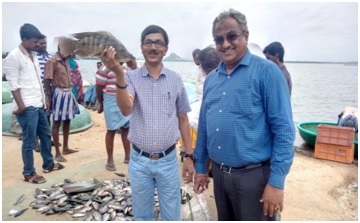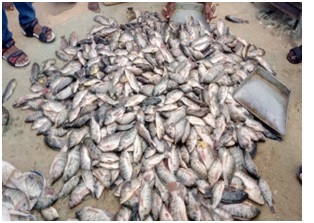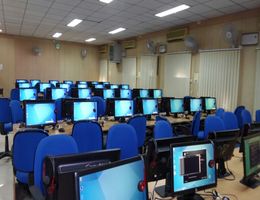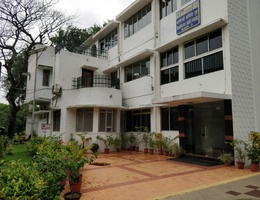Overview
Publications
Recruitment
Intranet
Dr. U. K. Sarkar, Head of Division, Reservoir and Wetland Fisheries, ICAR- CIFRI, Kolkata along with the Scientists (Mr. M. Karthikeyan, Dr. AjoySaha and Ms.Jesna P.K.) of ICAR-CIFRI, Bangalore centre have carried out an exploratory visit to Krishnagiri reservoir, Tamil Nadu on 26th August, 2017with a view to assess habitat characteristics, present fish yields, fish assemblages and diversity of the reservoir under the Institute project, "Fisheries resource assessment and refinement of enhancement protocol through participatory mode in selected reservoirs of India". At the outset, the team interacted with State fishery department and discussed about the prospects of fisheries in Krishnagiri reservoir and problem face by the fishers and how ICAR-CIFRI can help in scientific management of fisheries activities in the reservoir through possible technical intervention. The reservoir is situated in hot tropical and semiarid climate zone in South India. There are 16 villages in the command area, which aredirectly benefited by this reservoir, and water from the reservoir is used for irrigation, fish rearing, livestock rearing and recreation purposes. While interacting with the state fishery official, it came to the notice that tilapia (Oreochromismossambicus and O. nyloticus) is the major (> 90%) dominating species in the reservoir along with a few other species (viz.Labeorohita, Cirrhinusmrigala). The official said that high rate of sedimentation has reduced the capacity of reservoir and thus affect the fisheries. Sewage sludge dumping is another reason for low productivity of the reservoir making it hyper-eutrophic. The official said that they are also facing problem of stocking the Indian major carp (IMC). The team has also visited the National Fisheries Development Board (NFDB) supported (NFDB) cage culture site at Krishnagiri Dam reservoir for tilapia (Oreochromismossambicus and O. nyloticus) production, and interacted with the state fishery official about issues related to problems in cage aquaculture in reservoirs. The team also visited the fish seed production unit and breeding farm operated by the state fisheries department. Team has assured for all sorts of technical support for fisheries development in Krishnagiri reservoir including training skill development and knowledge up-gradation to the officials for improving the fish productivity of the reservoirs. Modalities of implementing Electronic Data Acquisition System (eDAS) in Krishnagiri reservoir to collect fish catch data were discussed with the State Fishery officials.














